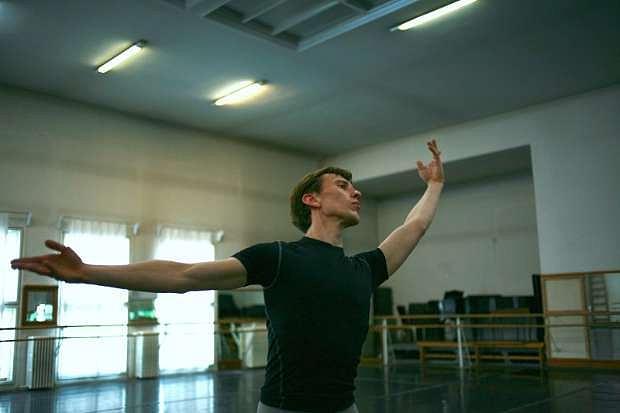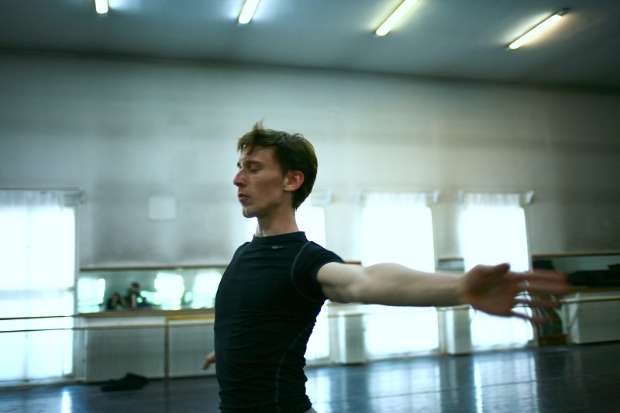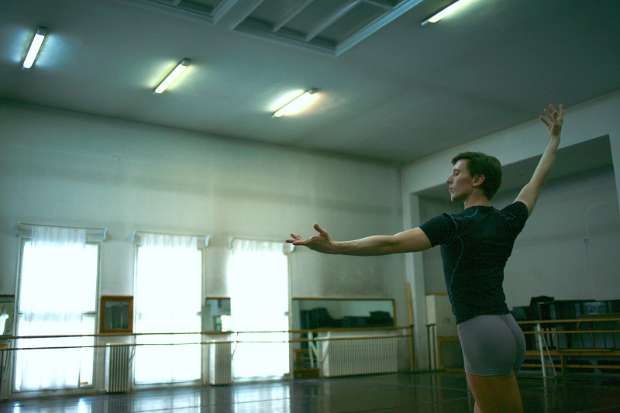Dancing the pressure away

Dawid Trzensimiech left his position as a soloist for the Royal Ballet in London to start afresh in Bucharest.
Dawid Trzensimiech stretches his legs in the big, empty rehearsal ballet studio at the Bucharest National Opera. He got a stomach flu right after Easter, so he couldn’t rehearse in the last week and missed a show on Sunday. He hesitated whether he should perform or not, but he then decided it was not the best idea to go ill on stage. Now he’s back on his feet and does the warm-up before the rehearsal. He’s still new to the place, as he started working as a principal with the Bucharest National Opera only two months ago. It was then when he quit his position as a soloist for the Royal Ballet in London and started everything all over again.
“My story is pretty straightforward. It’s almost like Billy Elliot in a way. I was brought up in an industrial area in Poland, with a mining industry. Myself and my family didn’t know anything about ballet.”
That’s how Dawid starts talking about his life with a perfect British accent and a perfect sense for storytelling. The recorder is on, but this doesn’t seem to intimidate him. Quite the opposite, it functions as a sort of silent public, which asks for perfection, which Dawid is used to delivering. It’s not like he’s performing, because he’s very honest and speaks very naturally, but you can feel in his speech the discipline and focus of a performance. He’s 25, but he seems way more mature.
Dawid started ballet when he was 7, just because there was a possibility to take a ballet class and he had an hour gap at school. He liked it from the beginning and the teachers liked him. He was focused, he knew what he wanted and ballet felt natural. At 17, a teacher from the Royal Ballet School in London spotted him at the Prix de Lausanne competition and invited him to study there. He had two other offers, both impressive, but he decided for London in the end. “I had some VHS-s of the Royal Ballet performances and I’ve always wanted to at least see them perform once.”
Halfway through his graduation in London, after a year and a half, the director of the Royal Ballet, Monica Mason, offered him a job with the company. He was on the ensemble de court of ballet for three and a half years, then he got promoted to a position of first artist, and in 2012 he became a soloist of the company.
London felt like home. Totally. He first lived in the Covent Garden area, ten minutes away from the Opera House. “The schedule is so intense that you spend most of the time with colleagues at school or in theatre.” Later on he moved to Richmond, a small suburban town in southwest London. “It was just nice to go on a train and somehow separate work and your private life. If you live in Covent Garden, that’s all it is. You’re so close to work and you feel that you can’t just switch off whereas being on a train really helped me.”
As a ballet dancer, you’re quite under pressure, Dawid says. “You’re constantly judged and you have to go on stage and deliver and that’s scary. With time, pressure doesn’t diminish, quite the opposite. To begin with, when you’re younger, you don’t care as much. You don’t have that much of a knowledge so you don’t know what to expect really. You just go on stage and do it.”
“I got to the position of soloist and that already steps it up. You have to deliver better shows because you’re a soloist, not just a court ballet dancer. And obviously we’re not machines, we sometimes deliver a good show, sometimes it might be a little bit off.”
With over 140 shows a season, he sometimes went on stage completely exhausted. “You literally don’t want to be on stage because you’ve got no energy. Royal Ballet delivers one of the best performances in the world, best costumes, a very professional audience that has seen one of the best dancers of the world. On that stage, in that position, if you fail, it feels terrible. It feels really bad.”
Dawid talks about all these very honestly, but with a certain delicacy. He doesn’t try to blame himself or anybody else, at least not obviously. “I don’t know if it was the problem of the company or it was just my personal issue, but I lost the passion for dance,” he confesses. “Working for the Royal Ballet can be the greatest thing but same time if you are not enjoying what you do, it’s such a hard profession. It’s not worth it.” He even thought about quitting ballet altogether and started researching universities. He was offered by the director of the Royal Company the chance to take time off and to change things, but things got to such a bad place that Dawid thought he just had to forget about it and start a new chapter.
“I tried to remember what was the last time I was really happy in studio and inspired. And it was when I worked with Johan Kobborg, the current director of the Bucharest National Opera.” He approached Johan himself since he had recently learned that he became a director there. And he’s been here since March.
“I was in my hotel room, in my first week here, and it just really hit me: that chapter in my life is done, is finished. It’s realising that it’s not just about work, because I was really happy with classes and rehearsals I was doing here, it was with my private life as well. I had to start from the very very beginning. I don’t know anybody. Suddenly it has hit me. But it’s better. I’ve made a few friends.”
He feels like here he’s got more time to rehearse, to focus on roles. “It’s been a rollercoaster of emotions but I’m getting there. I’m definitely seeing hope. I’ve lost the hope there to become a better dancer.”
After the recorder goes off, as the rehearsal is about to start soon and I’m walking next to Dawid to the dance studio, I notice something different about him. Outside the formal context of an interview, he seems more of a boy in his early twenties, still searching. “I’ve gained as a person a lot through ballet. I’ve definitely gained a lot of confidence. I’m still trying to get more confidence in social situations,” he says.
Dawid does his warm-up waiting for Johan Kobborg, who was a principal dancer with the Royal Ballet and left the institution in June 2013 and became the artistic director of the Bucharest National Opera in January 2014. “Johan saw something in me, back in London. He’s picked me from the court of ballet, against all odds, to act in one of his shows, when I was only 22. He thought that if you give enough time and coaching into this boy, it could be something good.”
“He’s an amazing actor himself, probably one of the best in the world, a ballet actor. And I’ve always struggled with sort of being natural onstage and he’s been great with injecting that in me, the importance of caring on the role is not just about delivering perfect steps, but overall if you have to become a character, you have to be that character, you can’t be Dawid doing steps.”
When Johan arrives, they talk a bit and then Dawid starts rehearsing. His discipline can be noticed not only in his movements, but also in the vigilant way he listens to Johan’s explanations. It’s goes both ways. Johan’s agile look studies Dawid's dance, and Dawid immediately reacts to his suggestions.
It’s an old studio where Dawid is rehearsing, but there is something about this big, empty space which seems appealing. It’s the probably the freedom of a place where you can start anew.
By Diana Mesesan, features writer, diana@romania-insider.com















